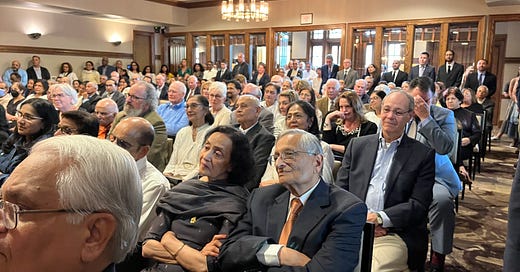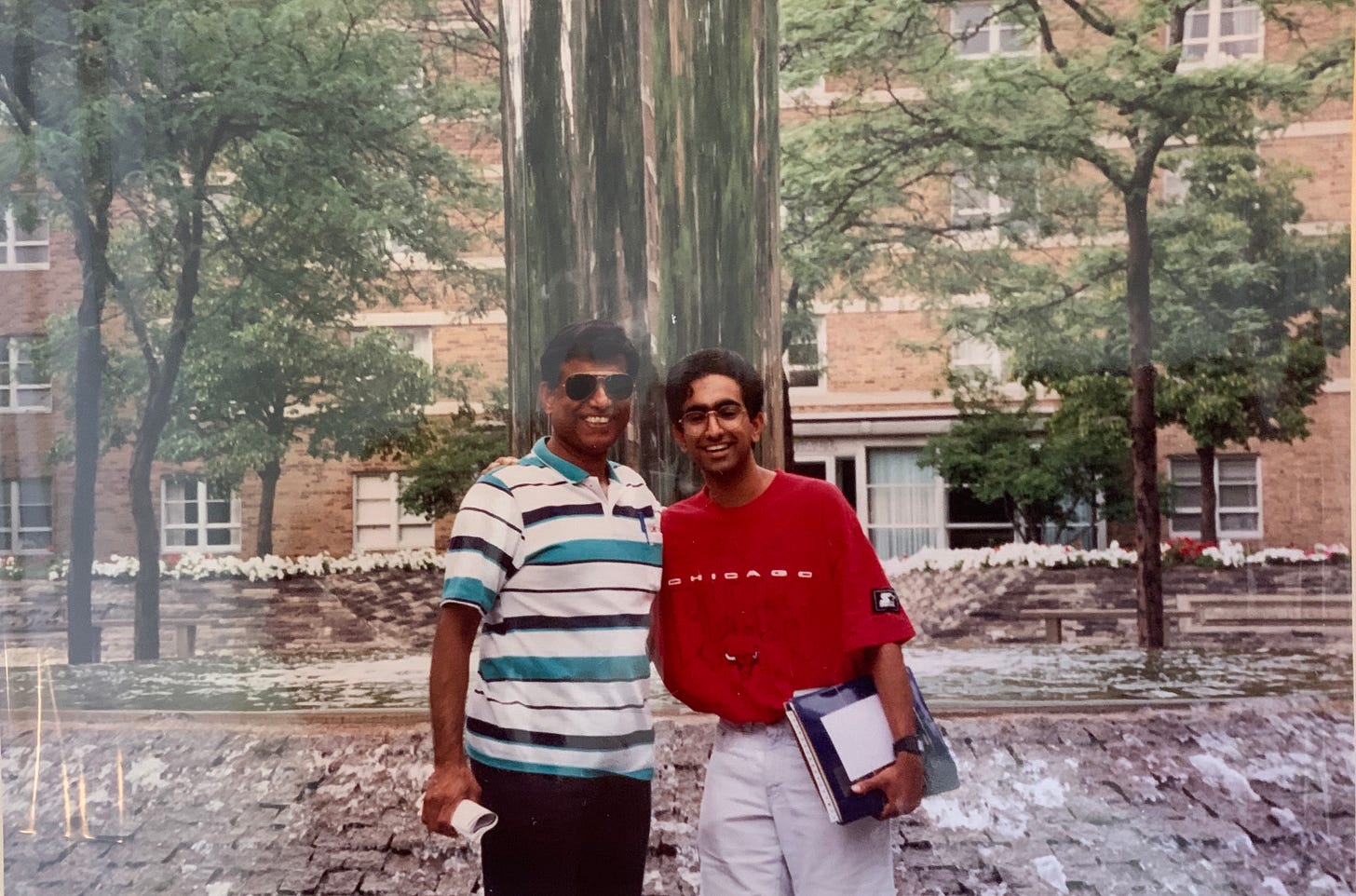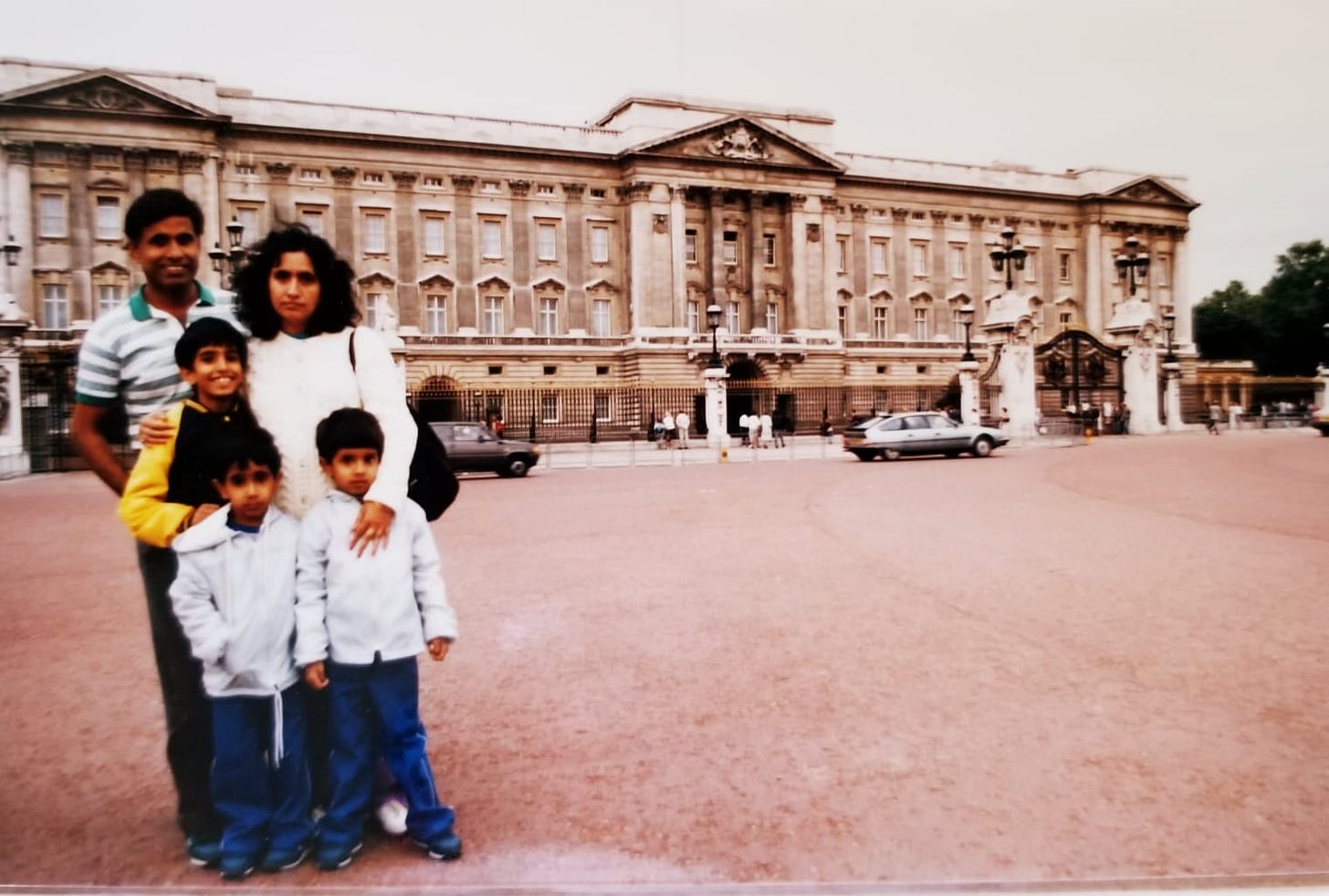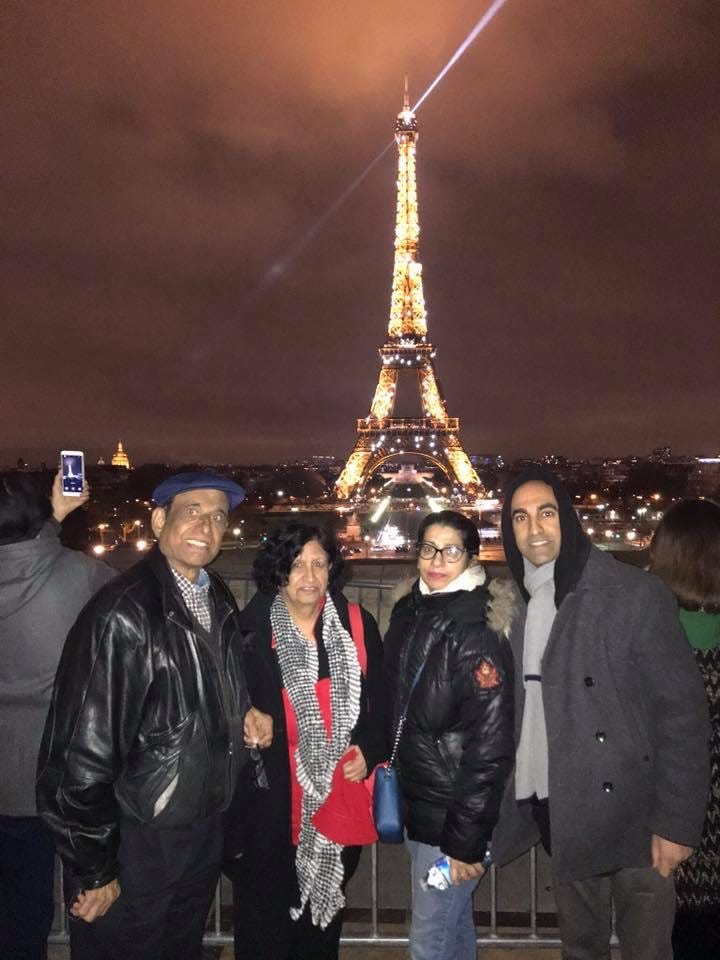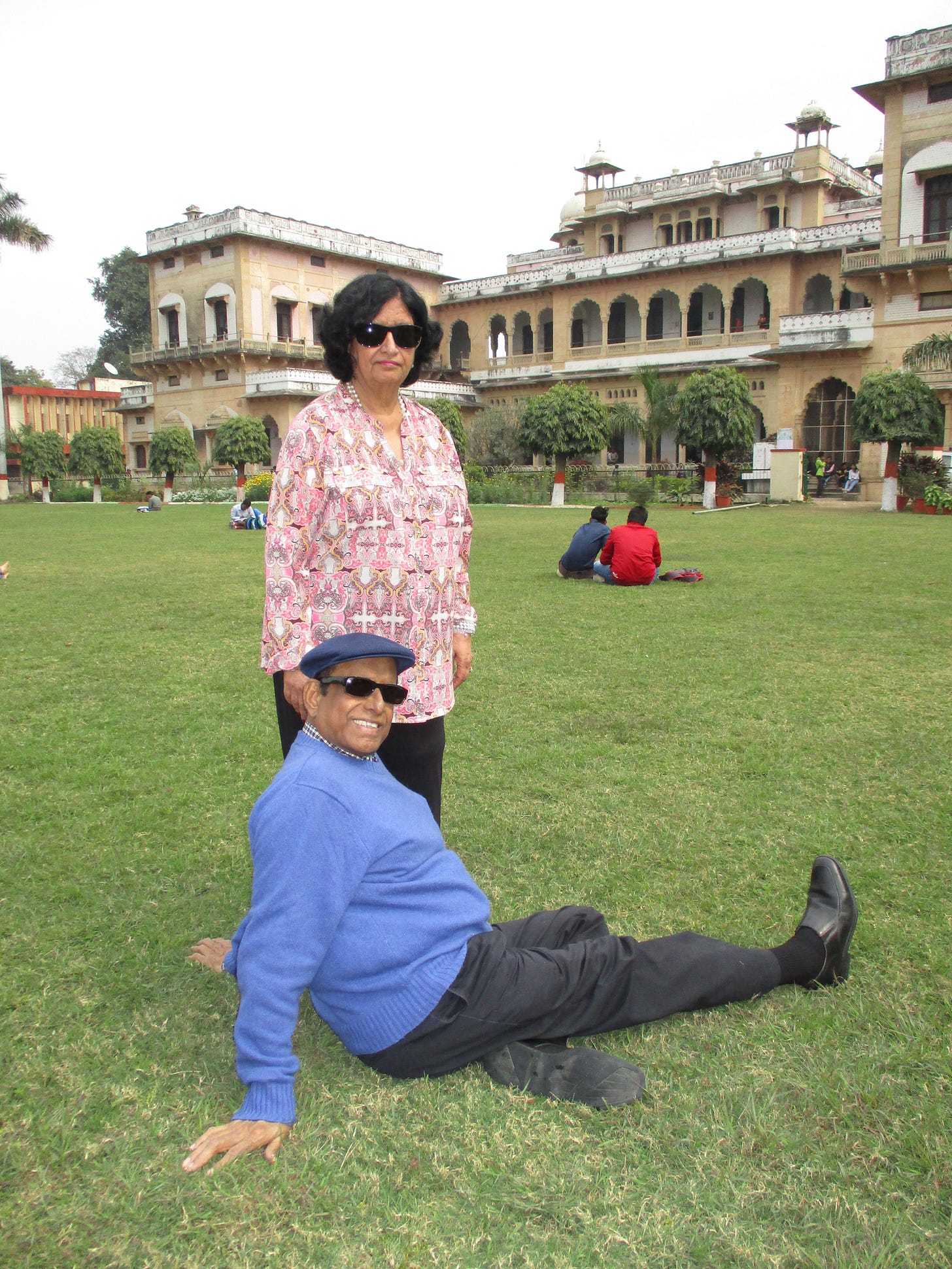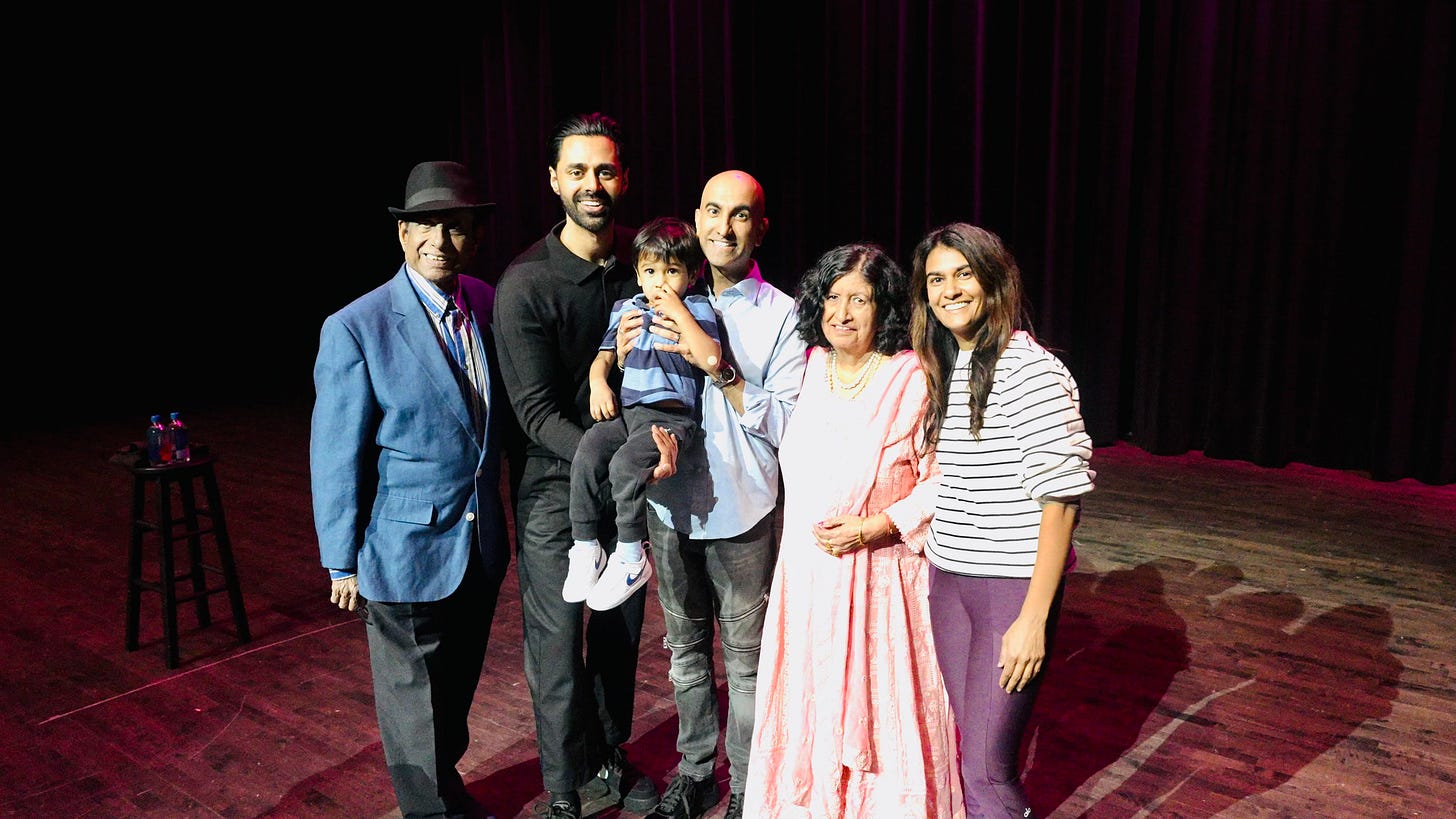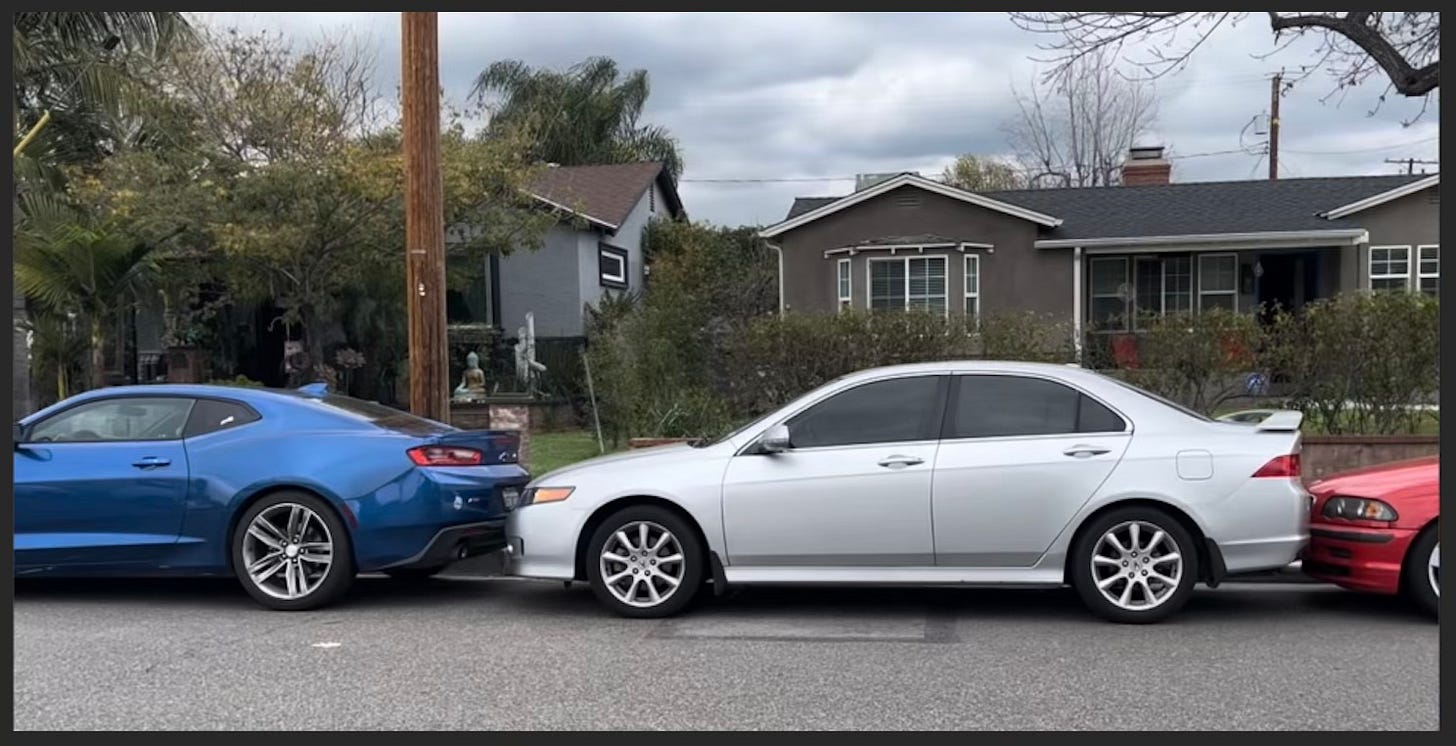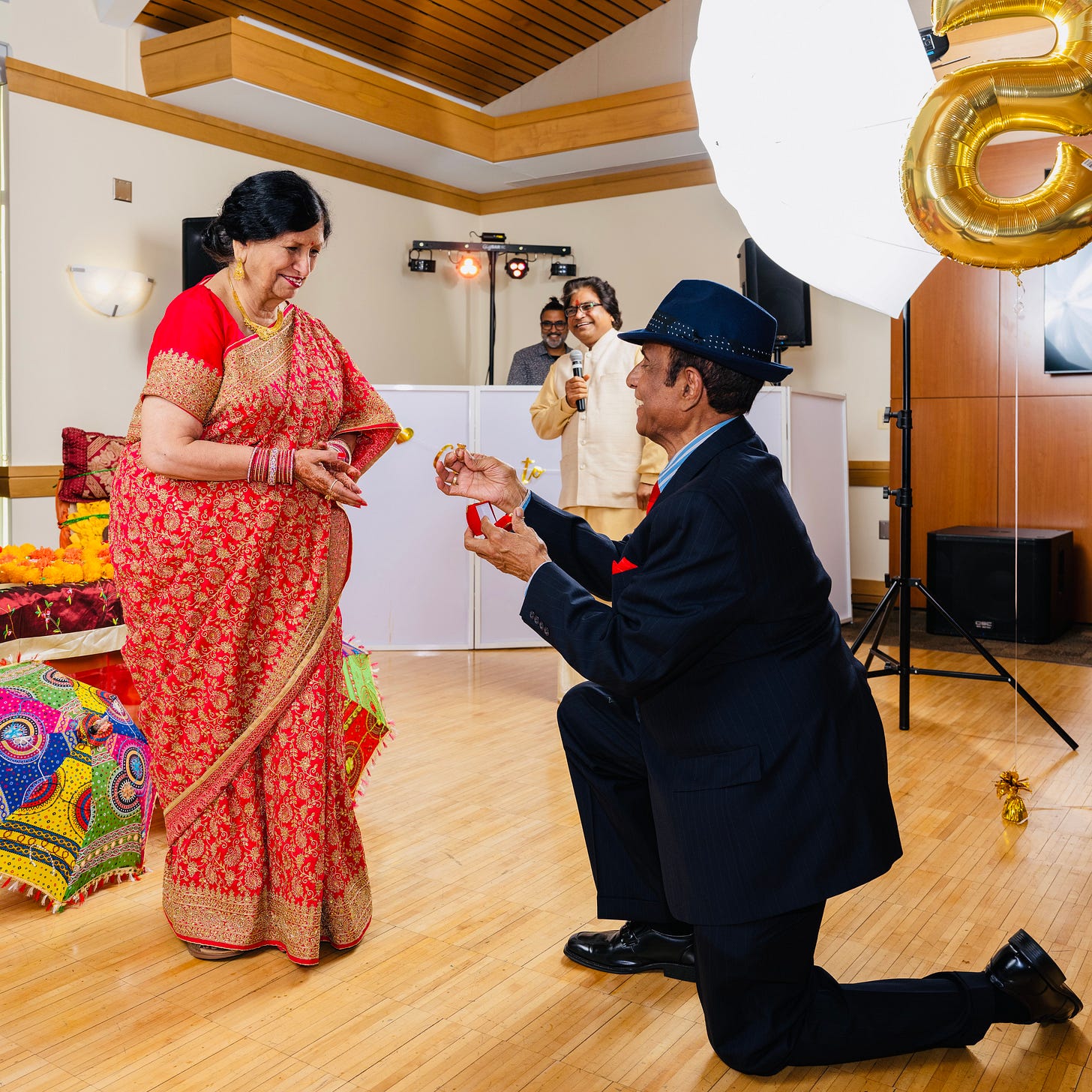This turned into a four-part series.
A Man of Many Hats (May 2024)
Father’s Day (June 2024)
Lessons on Grief (July 2024)
Final Thoughts on My Dad... (August 2024)
Today, on Father’s Day, it is my sincere hope that this post uplifts your spirits. I cannot thank y’all enough for the messages and flowers you’ve sent this weekend. You’ve certainly uplifted mine.
In May, I wrote a post about my late father: A Man of Many Hats. I should’ve included a link to donate, listed at the bottom of Spring Grove Funeral Home’s obituary. Here it is.
My plan in June was to share both my eulogy and what I’ve learned in the five weeks that have passed. But as I wrote it all out, it got very long, so I’ll give you the eulogy this month and then wrap up this marathon focus on my father in July.
The Eulogy
We weren’t sure whether to tape the service so we made a last-minute recording. We’re so glad we did. Here’s my eulogy, written out, lightly edited for clarity, and with pictures added for levity.
I always wondered how people did this whenever I saw families gather to do this. I'm like, “How? How are they keeping it together?” I would consider this keeping it together: anything short of falling on the floor is keeping it together. I never thought we could do this. And the answers are God. And everyone in this room. That's how we do it.
I was telling a story to John and Rakesh and Vikas on the way over here. And it wasn't part of my speech, but they laughed and they're like, “I never heard that story before.” I went to Case Western Reserve University for a couple of years in Cleveland. And I remember my Dad would send us these care packages. You know, parents love to do that. But he worked at General Mills. So these were amazing care packages: Fruit by the Foot (Fruit Feet) and Squeezits and granola bars and everything that you can imagine. Jeff, you know what I'm talking about; I’d bring that stuff to Fairfield High School, Fairfield Middle School, and trade for them. And they were great. And I remember my Dad asked, you know, “How are the snacks that I sent to you at Case Western?” I said, “Oh, Dad, you know, I actually passed a lot of them out. Because I'm running for Class President and I think I got a lot of votes and this is gonna work out for me.” Long silence. “Dad, are you there?” He replied, in a very serious tone, “Whatever furthers your cause.”
Ouch. But yes, that was fair, he was not happy about the fact that I did not eat them myself.
I’m really gonna try not to make this about me. I want to make it about him. But those of you who knew my Dad extremely well know that I probably get my ego from him. So if it ends up about me, it's kind of fitting in the end. So, I will share with you the only way that I can see my father, which is through my own eyes.
They say comedians are people who didn't get enough love or got too much love. And I'm happy to say that I'm in that second bucket of people who got way too much love. Comedians are supposed to be cynics underneath it all, but I have to tell you something really cheesy. And that is that I live in awe of the human spirit. That's not something that comedians are supposed to say. It's not funny. It's not cynical. But I live in awe of the human spirit. I read about history — Dad was such a history buff — slavery, genocide, wrongful imprisonment, all of these things. And people go on. They go on. I don't know how they do it, but they go on. And the answer is God and the people in this room.
I feel for everyone here. I especially feel for his brother, Vimal Uncle, who has known him for so long. And Barbara Aunty who could not be here today, and is here, in spirit, with us in this room. And Melina (their daughter, my first cousin), my brothers Rakesh and Vikas, and above all, for my Mom.
You've gotten an inkling of what happened. Basically, last Tuesday night, it was very stormy; there were tornadoes. A lot of people here were up. And I was flying over that storm from LA to New York. And luckily, my flight was delayed. There have been a lot of delays. But I'm glad it was because it means that I had some opportunity to call home. And my Mom and Dad were sitting in the family room, waiting for my call. I called and we talked for 10 minutes. The last thing I said was, “I love you guys.” And that was it.
My Mom and Dad sat until the storms blew over. And then the next morning, my Dad had a WAIF radio station meeting and a tennis meeting. And so my Mom was wondering how he's sleeping in so late. She went up to check on him. And then she went up again to check on him and he wasn't, you know, responding. She called and he didn't pick up his phone. And that told her a lot. She went up there and she stood over him. She called 911. And they asked her to touch him, which was the most difficult thing she's had to do in her life. (And of course she would love to speak here today but is in no shape to and that's why we're happy to carry that torch.)
She felt that he was cold, which means that it had to have happened many, many hours ago. Mom, I know you said you wish you would have gone up there earlier, but it would not have made a difference.
This was the plan all along. It's all that we can ask is to go peacefully in our sleep and Dad hardly ever slept. That was the irony of it, that God had to find those two minutes when he was in R.E.M. to pluck him from the Earth because he never really slept well at all. And I don't wish that on anyone to find your spouse like that. That was very, very, very difficult. And our best guess is it was a heart attack. That's our best guess. We talked to a couple of our friends who are doctors — a lot of Indians here.
My wife is a pharmacist: a pulmonary embolism was your best guess. And those happen fast. You know, Dr. Amit Goyal was telling us that the first symptom — this is not a joke — but the first symptom is death. That's what happens: one out of three at that age. It happens. And my Dad had high blood pressure and COPD, but many of you saw him just this past weekend at Era Gupta’s. A lot of you are saying, “How can this happen?” You were just playing cards with him (and winning, probably). Just a few days later, he was gone. And everybody is completely shocked. Many of you had seen him last weekend out with my Mom. He was so full of life that we really thought he had at least three or four years left.
We were here in Cincinnati two weeks ago. And he had so much strength that I heard him argue with an aunty about not giving two weeks’ notice for an ad placement on WAIF. Aunty, you know who you are. He was so forceful. He was such a stickler. He was such a vital person for most of his life. And I'll get to that.
I am so sorry that my Mom had to find him that way. Although it is fitting on some level to be with your partner. The reason I feel for my brothers is they have real jobs. I am weird. My job… I once wrote a 15-page document about myself. And I remember sharing it with my Dad. And one of my favorite moments was in the family room. My Dad sat, he read it, he read the whole thing. And he set it down. And he looked at me and he said, “I really wish I had what you had: you can really see yourself.” And if that sounds like a self-compliment, it is.
But I must give credit where it's due. I often heard his voice. He often talked about how “someday when I am no more…” He would say that a lot. He would always say things like, “This time next week, you'll be in California…” “You’ll be in New York…”. “You’ll be in Texas…” He was always projecting into the future. And I remember he would start so many of his sentences with, “It should not happen that…” He would say that a lot of the time: “It should not happen that the plane lands and [this].” “It should not happen that the exam comes and [this].” It should not happen that… That was his warning. And it forced me to — as Stephen Covey would say — “begin with the end in mind.” What should not happen?
Well, it should not happen that you live your life with regrets. That should never happen. Because I'm not interested in people's regrets. People tell me “I should have done [this].” “I should have done [that].” And I tune out, because you didn't walk that path. How do you know? There's no point in telling people what you should do if you yourself did not walk that path. And good people, we always feel like we could do more. (“We.”) They always feel like they could do more. But I really took my Dad's phrase to heart — “it should not happen that” — and I tried to project the future and work backwards.
The only podcast question that my Mom had me take out of my podcast was, “How old is old?” I would love to ask that question. “How old is old?” And she said, “Take that out.” Because she knew my answer to that question was 80. In their generation, that was enough. But she’d say not to say that. That's just not a great thing to say, that should not be on your podcast. And nowadays we see people live into their 90s routinely. JIMMY CARTER IS STILL IN HOSPICE. How is he still in hospice a year later? He is still going strong. I don't know how it’s possible. [I guess he really knew inflation.]
My parents had me late. My Dad was 34. So I had done the math. I had thought about it. And I realized, you know, probably in my late 40s is my guess. When my Dad turned 80, I did remove that question from the podcast.
By the way, my Dad was 81. This is a really, really important point, and my Mom was like, “Oh, don't put that in there.” But I'm spilling one of his secrets. He was actually not born in 1944. He was born in 1942. This is true and I'm telling you this for two reasons: One is I still don’t listen to my Mom. Two, I can't take the fact that Dad was only 79. Okay, I can't take that. I know it's a number, but 81 sounds much older to me than 79. And the uncles here today are like, “Yeah, I'm glad it’s not 79.”
And living to 80 is an achievement. It's an achievement. It really is and I don't want to take that away from him, if he’s gonna get a 30-year pin [from the Western + Southern tennis tournament] today. Eighty years is a big deal and we should not deprive him of that.
My very first Go Bananas performance is on YouTube from 1998. And the reason it's there is my Dad recorded it. Not with an iPhone, not with a Droid, but when you had to bring in — it wasn't quite the… I remember those two Panasonic silver things that we had to carry down to Disney World, which he did — but it was actually a big, big camera and he had it on this VHS tape that we converted and put on YouTube. That's because my Dad recorded so many of our lives, so much of my life, through his pictures and his videos. It’s documented because of him. And Aristotle once said (apparently), “The eye cannot see itself.” My Dad did that seeing for me.
I talked about not having regrets precisely because I haven't held a real job in almost 20 years. My job involves asking questions and having conversations. This past week, when people have asked me, “What can I do?” So many of you have offered: “What can I do?” And Ian [Director, Fitton Arts Center], you took out our trash yesterday, I cannot believe you did that. That was just… we were performing. My Mom did a Bollywood program at your facility there in Hamilton, my birthplace. My Mom taught for 36 years there. My Dad knew the statue of Alexander Hamilton the very first night he landed in the States and Bob Sackenheim took him around and was blown away by the fact that my Dad knew who Alexander Hamilton was. Hamilton's very special to us.
And what people can do is, yes, call the people, call your parents, tell them you love them. Call the loved ones in your life and resolve any conflict that you might have. But above all else, do this: I sat down with my parents over the course of three recording sessions. And I asked them every question I could think of. I asked them…
What are your hopes? What are your dreams? What are your fears?
What was it like the day you came to this country? (I had no idea. I knew my Dad flew into JFK and took a helicopter from JFK to LaGuardia and then flew to Cincinnati. But he told me the entire journey coming from India to the United States. I didn't know the story.)
What was it like the day I was born?
Ask your parents if you still have the opportunity to ask them. Ask them in a video recording if you can; at least audio-record it. Ask them what their bucket list is. Ask them if they're happy. And if they're not, what they'd like to see before they go.
The upside is my Dad did not have much of a bucket list left. That's a big upside. We did it all. And we were very aware of the little time we had left. We were in the fourth quarter and I talked about it often. He was my international manager. We traveled around the world: we went to Bombay, Bangalore, New Delhi, Istanbul, Kuwait, Dubai, Paris, Allahabad… My Dad and my Mom got to see me perform at El Chico, which was their rendezvous spot as they were falling in love. Who gets to see that? Who gets to go back to India to this restaurant where you were with your bride and watch your son perform? That's insane. He did that. He got to do that.
The last time we spent together — Harsha, you alluded to this — was epic: he got to see me open for Hasan Minhaj in front of 3,000 people. Hasan spent half an hour with them after the show. (Even when I wasn't spending that time with my parents.) He sat with them for 30 minutes and made everybody here wait — Sadaf, wherever you are, all the people are waiting in that room. That's what he was doing. He was talking to my parents. He told his tour manager, “Take care of Rajiv’s parents like you take care of mine.” Because his parents would stay with us, my parents would stay with us [when he lived with me for two years in Studio City]. And I would think, “How similar are Hindus and Muslims? How can we have such differences? Your parents are just like my parents and my parents are just like yours.” His tour manager brought them tea. So yes, Dad went out with a bang. That was the last night that we had, out on the town. Yes.
For my part, I'm happy that we had the conversation on Tuesday night, that I ended with, “I love you guys.” I'm so glad I stopped getting pissed off every time he asked me to do something on the computer. I really was telling myself, “Don't get mad at him.” You have got to slow down and be gentle. Vikas, we talked about this: every time he wants to take a picture, just let him take the picture because it's not gonna last forever.
I'm glad that I didn't… So many times, I would snap at him, like why couldn’t he just understand it? And I remember how patient he was as a father, and Mom as a mother with us. And I realized that you’ve got to stop snapping. You can't do that. In the last five to seven years, somebody said to me to stop getting annoyed and slow down. I really did take that to heart.
And the pandemic helped a lot of us with that. I'm happy I told them how Harsha and I talked about how this was the golden era: when both sets of our parents are alive and we have Naveen. But this isn't gonna last forever. It lasted two years and nine months. (That’s how long I had braces. So anyway… I had them twice… we believe in reincarnation. I don’t know.)
Dad’s death was sudden, but it wasn't untimely. Maybe 20 years ago, I remember saying to him that sudden death was the worst. And he replied, “No, it is bad, but untimely death is worse.” His mother passed away when he was only 12. (He wasn't 10. He was 12.) I remember that story about India’s partition and how it did not make sense because he walked the Line of Partition from undivided India into India. Vimal Uncle, your family lost everything you had. I said, “That math doesn't make sense if you were born in 1944 and it was 1947… How were you three and how was Vimal Uncle there at all?” We’re Indian. We’re good at math. There’s no way that’s possible. So much of his life was informed by that walk over the Line of Partition.
His mother passed away on his birthday. On his birthday, she passed away. Okay, I don't know what could be sadder than that. He walked the Line of Partition with his brother, which was extremely difficult. They lost everything they had. And above all, you’re right, Vikas, he did not see the Bengals win the Super Bowl.
That was really hard and I’m serious: we talked about that. But if they win this coming year, it would be amazing. But I remember feeling for the women the night that Hillary Clinton didn’t win. There were so many old women there and they wouldn't see a female president. Dad doesn't share that sentiment, but anyway. In fact, there are a lot of comedians who talk about how they could never make their Dad laugh. That wasn't true for my Dad and me. We made each other laugh a lot. He loved laughing; everyone here knows that he loved to laugh. In fact, he was the object of so many of my early jokes, and he never minded it. In fact, he celebrated that, handing out my business cards to so many people, and when nobody would reply to my newsletter, he was the first one who would reply — the only one who would reply —“Great job. Lovingly, Dad.” He would always sign his emails with “Lovingly, Dad.” He was my number one fan.
Fifteen minutes after I got the news, my dear friend Raman Sehgal — a fellow Punjabi, the ultimate empath — he started to look up flights to Cincinnati. And he found one on Allegiant Airlines. And I was like, “Allegiant?? I don't want to meet Dad that quickly.” And he's like, “Really? It's been 15 minutes.” And I said, “Look, we lost a Trump vote in Ohio.” I can do it. I can still joke around.
The thing that blew me away two weeks ago was a joke said that Dad made and I was completely stunned because we were talking about dementia. And how awful dementia is. And there are some people here we know, who have it — whose phones keep going off… I'm kidding — some other people who have dementia. And I remember saying, “It's the worst. It's The Long Goodbye. It's the saddest thing. And if you lose your legs, you know, I'd rather lose my legs. Because if you lose your legs, you have your mind. But if you lose your mind, what do you have?” Without missing a beat, my Dad goes, “Legs.”
That’s an amazingly good joke! A really good joke! I couldn't believe he said that. I'm just blown away that he turned that so quickly. I was just like, wow, that was really good.
[Not only was it a great joke but I also remember the look on his face. Even in that moment, it felt like God told me that joke. I can’t entirely explain it, but it felt like Dad was more a vehicle or a vessel of some sort.]
He taught me about things:
He taught me how to write a letter.
He taught us how to file papers.
He taught Rakesh, Vikas, and me how to stay organized.
He taught me How to Win Friends and Influence People — that was the book me gave me when I was 12.
He taught me how to parallel park and we were out there in Burbank the other day and that was the ultimate compliment when he goes, “I don't know how you got this car into this spot.” Three inches on this side and three inches on that side. He goes, “I can't believe you can parallel park like that.” All the men here know what I'm talking about. Women are like, “Who cares about parallel parking?” I told Harsha early on how much that means to men and she said to me, “Your parallel parking skills are amazing.” Like, that's the only thing you ever need to say to a man.
Out of his three sons, none of us married early. And I told Dad that the upside is that there's probably not a couple in this room that got to spend more time with their adult children. But nobody ever tells you the downside of getting married late: about how old your own parents are going to be, when Naveen is still so small. That's been what's really difficult.
I'm happy that Dad was still so strong.
I’m happy, as men, that we did not see our Dad deteriorate. We did not see that; that’s so hard to watch.
I'm happy Dad got to see the success of his sons and his wife.
I'm happy he got to see his wife turn 75 and his marriage turned 50. A lot of you were there.
I'm happy that he got to see us plan his 80th birthday — his “80th” Birthday — this fall. Russell Peters told me that it was really hard for him that his Dad died before he blew up. And he said, “You're lucky that your Dad is seeing this.”
I'm happy that our family was together.
I'm happy I told Dad that I saw his point-of-view in arguments with my Mom more and more as I myself became a husband and a father.
There's a scene in one of our favorite movies, Quiz Show, from 1984. Ralph Fiennes is talking to his elderly father about chocolate cake and milk. And he says, “I cannot think of anything that will make me feel that happy again. And his Dad replies, “Not till you have a son.”
One of my favorite quotes is, “The reason grandparents and grandchildren get along so well is they have a common enemy.”
Who was Dad? Who was he? Because it's hard to tell who anyone is because we're different with different people: when Rakesh and Vikas and I would share stories about him, we were just like, “Wait, he did that? He said that? That's crazy!”
As men age, they either harden or soften. And in some ways, Dad hardened. Greg Murray, he joined your team, the Republicans, we know. Politics was definitely one of those. But in so many other ways, he softened. Whenever you’d talk to him about any other topic. When I saw my Dad and Naveen together, I was like, “Who is this softie? Who is this person?” Not that he was hard on us. He wasn't. But they really were best friends.
And I'm happy I told him that he lived a blessed life. And that he died a happy man. He died of natural causes. And it is natural that he went first. Mom just told me that she and Dad would sit and discuss who would go first. And Dad said, “If I go first, I know you will be okay. If you go first, I won't be able to take it.”
The beginning of Dad's life was so rough. This was the gift that God gave him. He wouldn't have to see his wife go or his brother go or, God forbid, a child go at the end of his life. He’d be taken in his sleep.
Vikas, we talked about this: the end of the speech is the hardest because it’s when you have to say goodbye. Mom could not bring herself to speak today. But I'll leave you with what Mom said [to say]. She made these points and then I'll turn it over to the Acharya. Before we go, please come shake our hands. Lay the petals. Please have lunch (and tip your wait staff) and the family is gonna go back to the crematorium. But here's what Mom said:
He stood by me.
He often recalled our childhood memories.
He would run into someone from Bombay and I knew that conversation was going to take a long time.
He was steadfast whenever I was sick and he was a support system which has now faded and left me.
He took pride in all my achievements. He was disciplined and he was self-made.
He had such a love for music. He performed community service. He loved his tennis tournament.
He had a special bond with Naveen.
He didn’t sleep till we were where we needed to go. He would sit up on his phone until we texted or called.
He did whatever it took.
He was there for us.
He loved me.
Happy Father’s Day, Dad. We love you and we miss you.
Rajiv Satyal is a standup comedian. He resides in Los Angeles with his wife, Harsha; son, Naveen… and his mother, Lalita. This was Part II. Click here for Part III.

